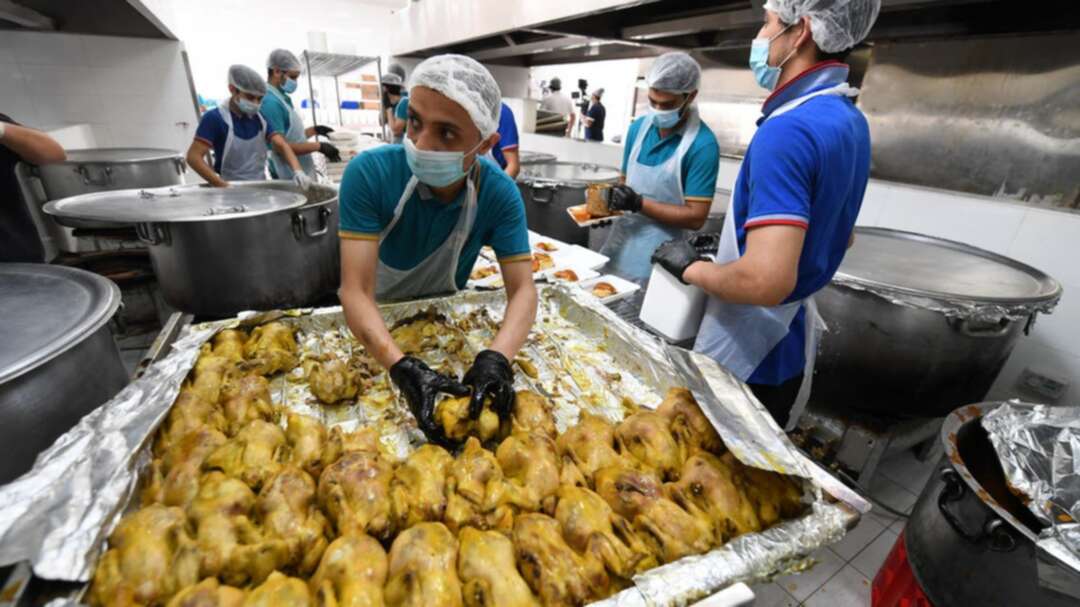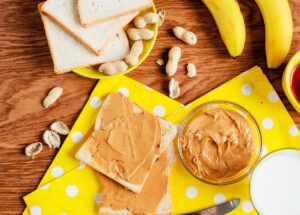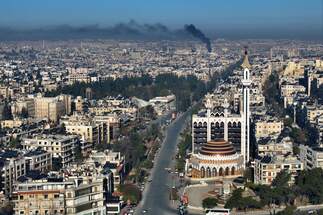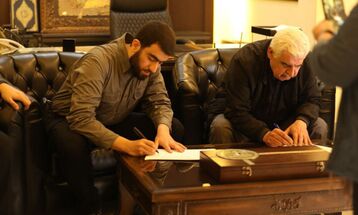-
UAE doctors warn of overeating at Iftar to avoid a trip to the hospital

Doctors in the United Arab Emirates are urging Muslims fasting this Ramadan to avoid overeating at Iftar and breaking the fast with high consumptions of unhealthy food.
Medical specialists told Al Arabiya English that hospitals each year see an influx of patients suffering from gastroenteric issues and stomach ulcers.
During the holy month, medics said that they often see patients complaining of gastritis – an acute inflammation of the stomach – and gastroenteritis, often known as stomach flu, which is an infection of the stomach and intestines together resulting in vomiting or diarrhea. This can often put a strain on hospital resources, they said.
Archana Baju, a clinical dietician at Burjeel Hospital, said that after long hours of fasting, metabolism slows down and so while breaking the fast, it is very important to introduce food slowly, as this aids in easier digestion.
“It is quite obvious after fasting there is a tendency to feast and often, we grab a calorie dense meal loaded with sugar and fats,” Baju said. “But overeating after fasting slows down the digestion and may lead to gastrointestinal difficulties such as indigestion, bloating and diarrhea and often ends up with a visit to the doctor.”
“It is the quality - not the quantity to be focused on. Right meal choices replenish energy and provide adequate nutrition and hydrate to our cells. And in turn will boost our energy levels,” he added.
The dietician advised on eating small meals spread throughout the feast period, eating slowly and shewing food well and planning healthy food alternatives ahead of time to avoid reaching for a sugary or calorific alternative.
Dr Sawsan Humaida, a specialist in internal medicine at Bareen International Hospital in MBZ City, said Ramadan is a good opportunity to revise lifestyles and adopt healthier habits.
“Eating food items with high saturated fats or overeating in general after fasting may cause poor digestion. To avoid this, people should eat small portions which can be repeated as desired, in a balanced manner,” she explained.
“Eat adequate amounts of proteins while drinking plenty of water in frequent intervals is a good trick to be healthy, enjoy Ramadan and avoid being sick and having to rush to hospital emergency rooms suffering with indigestion.”
“It is advised to eat dates and drink water once breaking the fast; that will help balance the body’s glucose level and assist with digestion. It will also help to prevent overeating as its high sugar and carbohydrate content causes the body to feel full quickly,” she added.
 Too often, people choose to skip Ramadan’s pre-dawn ‘suhoor’ meal altogether or choose the wrong foods. (Shutterstock)
Too often, people choose to skip Ramadan’s pre-dawn ‘suhoor’ meal altogether or choose the wrong foods. (Shutterstock)Dr Aswathy Mechur Jayachandran, a general practitioner at Doctor Moopen Medical center in Al Qouz, told Al Arabiya English: “This (overeating) is an annual occurrence we see during this holy month of Ramadan. Patients come in such distress it is difficult to manage their physical and emotional pain.”
“The key to avoid over eating and the uneasy acid reflux is to eat slowly and mindfully. Chew your food slow and savor the taste.”
“The brain tries to trick you to grab the next morsel before you finish your current one. When a flavor touches the tastes buds, it ignites the brain. You are under the impression to the grab the next bite as soon as possible. This leads to you to overeat and then a cascade of issues happens.”
Acid reflux is one of the main complaints seen after breaking the fast, said the doctor.
Many patients need medication to ease stomach cramps, intravenous fluids to rehydrate and sometimes a stay in hospital.
“The symptoms can vary from a heartburn to severe abdominal pain to vomiting and diarrhea. All these lead to severe discomfort and distress. Small simple and easy steps can help you prevent this.”
“Take a deep breath every five mins while eating and access your hunger level. Stop when you feel 80 per cent full.”
For those breaking the fast, choose foods with lesser fat and higher protein content, said the doctor.
“Drink less of sugary drinks and stick to more refreshing coolers. Try to also limit the caffeine intake,” she said. “Complex carbs such as oats and millets are your best friends.”
“They keep you full for longer with less of stomach issues. The lesser burden for the stomach, the less of a burden will the stomach be to you,” she concluded.
source: Jennifer Bell
Image source: AFP
Levant
You May Also Like
Popular Posts
Caricature
BENEFIT AGM approves 10%...
- March 27, 2025
BENEFIT, the Kingdom’s innovator and leading company in Fintech and electronic financial transactions service, held its Annual General Meeting (AGM) at the company’s headquarters in the Seef District.
During the meeting, shareholders approved all items listed on the agenda, including the ratification of the minutes of the previous AGM held on 26 March 2024. The session reviewed and approved the Board’s Annual Report on the company’s activities and financial performance for the fiscal year ended 31 December 2024, and the shareholders expressed their satisfaction with the company’s operational and financial results during the reporting period.
The meeting also reviewed the Independent External Auditor’s Report on the company’s consolidated financial statements for the year ended 31 December 2024. Subsequently, the shareholders approved the audited financial statements for the fiscal year. Based on the Board’s recommendation, the shareholders approved the distribution of a cash dividend equivalent to 10% of the paid-up share capital.
Furthermore, the shareholders endorsed the allocation of a total amount of BD 172,500 as remuneration to the members of the Board for the year ended 31 December 2024, subject to prior clearance by related authorities.
The extension of the current composition of the Board was approved, which includes ten members and one CBB observer, for a further six-month term, expiring in September 2025, pending no objection from the CBB.
The meeting reviewed and approved the Corporate Governance Report for 2024, which affirmed the company’s full compliance with the corporate governance directives issued by the CBB and other applicable regulatory frameworks. The AGM absolved the Board Members of liability for any of their actions during the year ending on 31st December 2024, in accordance with the Commercial Companies Law.
In alignment with regulatory requirements, the session approved the reappointment of Ernst & Young (EY) as the company’s External Auditors for the fiscal year 2025, covering both the parent company and its subsidiaries—Sinnad and Bahrain FinTech Bay. The Board was authorised to determine the external auditors’ professional fees, subject to approval from the CBB, and the meeting concluded with a discussion of any additional issues as per Article (207) of the Commercial Companies Law.
Speaking on the company’s performance, Mr. Mohamed Al Bastaki, Chairman BENEFIT , stated: “In terms of the financial results for 2024, I am pleased to say that the year gone by has also been proved to be a success in delivering tangible results. Growth rate for 2024 was 19 per cent. Revenue for the year was BD 17 M (US$ 45.3 Million) and net profit was 2 Million ($ 5.3 Million).
Mr. Al Bastaki also announced that the Board had formally adopted a new three-year strategic roadmap to commence in 2025. The strategy encompasses a phased international expansion, optimisation of internal operations, enhanced revenue diversification, long-term sustainability initiatives, and the advancement of innovation and digital transformation initiatives across all service lines.
“I extend my sincere appreciation to the CBB for its continued support of BENEFIT and its pivotal role in fostering a stable and progressive regulatory environment for the Kingdom’s banking and financial sector—an environment that has significantly reinforced Bahrain’s standing as a leading financial hub in the region,” said Mr. Al Bastaki. “I would also like to thank our partner banks and valued customers for their trust, and our shareholders for their ongoing encouragement. The achievements of 2024 set a strong precedent, and I am confident they will serve as a foundation for yet another successful and impactful year ahead.”
Chief Executive of BENEFIT; Mr. Abdulwahed AlJanahi commented, “The year 2024 represented another pivotal chapter in BENEFIT ’s evolution. We achieved substantial progress in advancing our digital strategy across multiple sectors, while reinforcing our long-term commitment to the development of Bahrain’s financial services and payments landscape. Throughout the year, we remained firmly aligned with our objective of delivering measurable value to our shareholders, strategic partners, and customers. At the same time, we continued to play an active role in enabling Bahrain’s digital economy by introducing innovative solutions and service enhancements that directly address market needs and future opportunities.”
Mr. AlJanahi affirmed that BENEFIT has successfully developed a robust and well-integrated payment network that connects individuals and businesses across Bahrain, accelerating the adoption of emerging technologies in the banking and financial services sector and reinforcing Bahrain’s position as a growing fintech hub, and added, “Our achievements of the past year reflect a long-term vision to establish a resilient electronic payment infrastructure that supports the Kingdom’s digital economy. Key developments in 2024 included the implementation of central authentication for open banking via BENEFIT Pay”
Mr. AlJanahi concluded by thanking the Board for its strategic direction, the company’s staff for their continued dedication, and the Central Bank of Bahrain, member banks, and shareholders for their valuable partnership and confidence in the company’s long-term vision.
opinion
Report
ads
Newsletter
Subscribe to our mailing list to get the new updates!






















